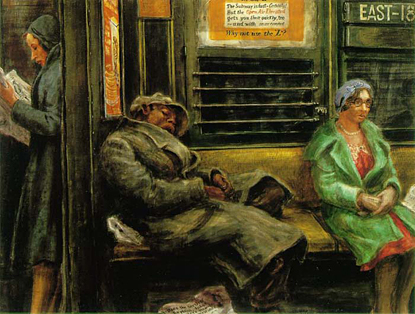
"Why Not Use the L?", Reginald Marsh, 1930, All rights reserved
Before I went to The National Museum of the American Indian in New York last week, I had never heard of Reginald Marsh. I only went to the Museum because Manhattan galleries think Monday is Sunday -- but that's another story. The Museum turned out to be in the Alexander Hamilton U.S. Custom House, an amazing beaux arts building with a graceful, skylit rotunda (another story too).

Rotunda of U.S. Customs House, designed by Cass Gilbert, completed 1907.
Reginald Marsh had painted the murals on the ceiling. As I stood there gaping at their energy, a very sweet Museum lady came up and told me Marsh had painted them as a WPA project during the Depression. His subject was the New York docks -- the mighty ocean liners churning through the harbor, bullied by tugboats, the gangways & huge nets being unloaded by muscular longshoremen, the long roadsters lined up waiting for privileged travelers -- in fact, his paintings depict what was, at that time, going on right outside the Custom House (it's located only a few hundred yards from South Ferry). My favorite mural shows a modern-looking impromptu news conference with an elegant woman in furs (the Museum lady whispered that it was Gloria Swanson) cornered by an intently jostling mass of reporters, newsreel cameramen and photographers. "How was Europe?" I could (almost) hear them shouting.
Looking up was like watching the past swarm into the present.
You can find out more about Marsh here. I liked reading that he worked for years -- including at the NY Daily News -- doing quick sketches from life, and that all his paintings started with sketches.
"Carousel," Reginald Marsh, All rights reserved
"Coney Island," Reginald Marsh, All rights reserved
"Battery Belles," Reginald Marsh, All rights reserved
"20-Cent Movie," Reginald Marsh, All rights reserved
I love these pictures because they put me in a city that's been gone for 70 years but is still, somehow, immediately recognizable. We all carry plenty of historical New York Citys in our heads -- say, Edith Wharton's decorous gilded age New York or, later, F. Scott Fitzgerald's wild but sophisticated city of swells & flappers. But in those images we rarely see the lower classes. Marsh concentrated on them. He contended that "well-bred people are no fun to paint."
You can see more pictures here.




1 comment:
Tim, thanks for writing about this.
Post a Comment